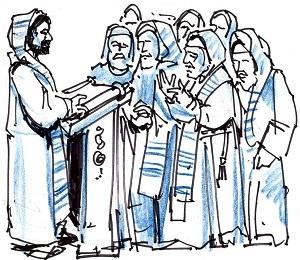

“Whoever exalts himself will be humbled” (Matthew 23:12).
Isa 1:10, 16-20; Matt 23:1-12
The Gospels were composed by assembling oral and written materials by theme. It is probable that Matthew put together all his collected sayings by Jesus about the scribes and Pharisees toward the end of his Gospel before the Passion narrative. Today’s criticisms are mild compared the blistering attacks on their hypocrisy that follow in verses 13-39.
Jesus first tells his disciples and the crowds to obey their religious leaders but not imitate them. They don’t practice what they preach. They are fussy about their outfits and titles, places at banquets. More seriously, they pile up burdens on people’s shoulders and do nothing to help them. It is curious that subsequent generations of bishops seem to pay so little attention to these jibes, but instead some indulge in clerical finery and enforcing canonical hoops for others to jump through. They scandalize the faithful and obscure the Gospel message for outsiders.
Matthew structures Jesus’ challenge to official obsession with rules and rituals just ahead of his final apocalyptic warnings and parables that culminate in the searing account of the Last Judgment in Chapter 25. The message is clear. What religion is really about is justice and compassion for the poor. God is not interested in burnt offerings, quibbling over texts and ritual cleansing when hungry, thirsty, naked, sick, imprisoned, outcast and persecuted brothers and sisters are waiting to be served. It is for their neglect of love and service that Jesus condemns the scribes and Pharisees.
If Jesus seems harsh it is because leaders not only fail themselves but also mislead others. Instead of making God accessible, they insert themselves as mediators who complicate God, condition divine mercy on their own scruples or authority. It infuriated Jesus to see his loving Abba misrepresented and distanced from ordinary people. Immersed in the cry of the people, Jesus was being slandered by pompous, self-righteous experts as they met for cocktails and dinner with their wealthy patrons to plot his destruction.
It is tempting to indulge Jesus’ criticism of the Gospel’s “villains” to narrow the spotlight from the general challenge it presents to all of us. The evangelists were engaged in their own polemics when they caricatured the rabbinic Judaism that expelled the church after the destruction of Jerusalem and the diaspora from Palestine in 70 CE. The scribes and Pharisees of Jesus’ time were not all hypocrites, and many followed Jesus along with members of the priestly class addressed by the Book of Hebrews at end of the first century. Jesus’ profile of corrupt religion, charlatans and hypocrites fits a whole class of con-artists and delusional power brokers who have always feasted on the credulity of others.
What Jesus wanted for his disciples was the beatitude of meekness and purity of heart that would preserve them in God’s presence, make them merciful to others and free them from the blindness that afflicted the self-righteous and rendered them incapable of compassion.
Advertisement








